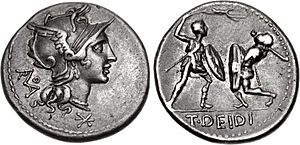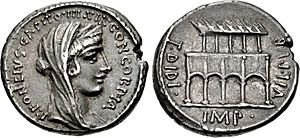Titus Didius facts for kids
Quick facts for kids
Titus Didius
|
|
|---|---|
| Consul of the Roman Republic | |
| In office January 98 BC – December 98 BC |
|
| Preceded by | Aulus Postumius Albinus and Marcus Antonius the Orator |
| Succeeded by | Gnaeus Cornelius Lentulus and Publius Licinius Crassus |
| Personal details | |
| Born | Roman Republic |
| Died | June 11, 89 BC |
| Military service | |
| Commands |
|
Titus Didius was an important politician and general in the Roman Republic. In 98 BC, he became the first person in his family to be elected consul, which was a very high position. He helped rebuild the Villa Publica, an important public building in Rome. He also led Roman armies in Hispania Citerior, which is now part of Spain. Titus Didius was honored with two Triumphs, which were big parades to celebrate his military victories. One was for his wins against the Scordisci people, and the other for his successes in Spain.
Contents
Titus Didius's Family History
Titus Didius came from a family called the gens Didia. This family was quite new to Roman politics. His father, also named Titus Didius, was known for passing a special law in 143 BC. This law, called the lex Didia, was a sumptuary law, which means it tried to control how much people spent on things like feasts. We also know that Titus Didius's grandfather was named Sextus.
Titus Didius's Career Path
Starting as a Coin Maker (around 113–112 BC)
Titus Didius first appears in history as a triumvir monetalis. This was one of three people in charge of making coins for Rome. He likely held this job around 113 or 112 BC.
His coins, called denarii, showed two gladiators fighting on one side. Some historians think this might have been a promise from Didius. He might have been saying he would put on gladiator shows if he was elected curule aedile. Aediles were officials who organized public games and festivals. We don't know if he was elected to that role later.
Serving as a Tribune (103 BC)
In 103 BC, Titus Didius became a tribune of the Plebs. Tribunes were officials who protected the rights of common people. He tried to stop another tribune, Gaius Norbanus, from prosecuting a general named Quintus Servilius Caepio. This happened after a big Roman army defeat at the Battle of Arausio. However, Didius was forced away from the legal proceedings.
Becoming a Praetor (101 BC)
Two years later, in 101 BC, Titus Didius was elected a praetor. A praetor was a high-ranking judge or military commander. During this time, he fought in Macedon (a region in ancient Greece). He defeated the Scordisci people there. For this victory, he was awarded his first triumph when he returned to Rome in 100 BC.
Reaching Consul (98 BC)
In 98 BC, Didius was elected consul, the highest elected office in the Roman Republic. He served alongside Quintus Caecilius Metellus Nepos. As consul, Didius helped restore the Villa Publica, a large public building in Rome. He also passed a law that made it illegal to combine two unrelated proposals into one single bill. This helped make laws clearer.
Governing as a Proconsul (97–93 BC)
After his time as consul, Didius was sent to govern the province of Hispania Citerior as a proconsul. He was in charge there from 97 BC to 93 BC. Most of his time in Spain was spent fighting against the Celtiberi people. During his four years in Spain, Didius won many battles. He is said to have defeated many Arevaci warriors. He also brought the city of Termes (now Tiermes) back under Roman control after it rebelled. He also took the city of Colenda after a long siege. Didius earned another triumph for his victories in Spain. A famous Roman rebel, Quintus Sertorius, served as a military officer under Titus Didius in Spain. Sertorius was even given a special honor called the Grass Crown for putting down a rebellion near Castulo.
Titus Didius's Death (89 BC)
After his service in Spain, Didius became a legate (a military commander) during the Social War. This was a conflict between Rome and its Italian allies. He served under different Roman generals, including Lucius Julius Caesar in 90 BC, and later Lucius Porcius Cato and Sulla in 89 BC. Titus Didius died in battle on June 11, 89 BC, shortly after successfully capturing the city of Herculaneum.
See also
 In Spanish: Tito Didio para niños
In Spanish: Tito Didio para niños
 | Aurelia Browder |
 | Nannie Helen Burroughs |
 | Michelle Alexander |



